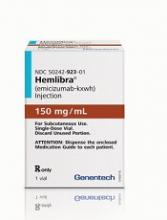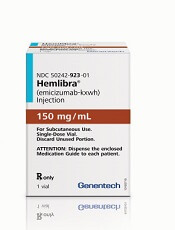User login
The US Food and Drug Administration (FDA) has granted breakthrough therapy designation to emicizumab (Hemlibra®) for patients who have hemophilia A without factor VIII inhibitors.
Emicizumab is a bispecific factor IXa- and factor X-directed antibody approved by the FDA for routine prophylaxis to prevent or reduce the frequency of bleeding episodes in adults and children who have hemophilia A with factor VIII inhibitors.
The FDA has granted emicizumab breakthrough designation for patients without inhibitors based on data from the phase 3 HAVEN 3 trial.
The trial enrolled 152 patients age 12 and older who had hemophilia A without inhibitors and were previously treated with factor VIII therapy either on-demand or for prophylaxis.
Patients received either no prophylaxis or emicizumab prophylaxis, dosed subcutaneously every week or every 2 weeks.
Detailed results from HAVEN 3 have not been released.
However, according to Genentech, prophylaxis with emicizumab produced a statistically significant and clinically meaningful reduction in treated bleeds, when compared to no prophylaxis.
In an intra-patient comparison, once-weekly emicizumab prophylaxis was superior to prior factor VIII prophylaxis, as demonstrated by a statistically significant and clinically meaningful reduction in treated bleeds.
The most common adverse events with emicizumab were injection site reactions, and no new safety signals were observed in this trial. No thrombotic microangiopathy or thrombotic events occurred.
About breakthrough designation
The FDA’s breakthrough designation is intended to expedite the development and review of new treatments for serious or life-threatening conditions.
The designation entitles the company developing a therapy to more intensive FDA guidance on an efficient and accelerated development program, as well as eligibility for other actions to expedite FDA review, such as rolling submission and priority review.
To earn breakthrough designation, a treatment must show encouraging early clinical results demonstrating substantial improvement over available therapies with regard to a clinically significant endpoint, or it must fulfill an unmet need.
The US Food and Drug Administration (FDA) has granted breakthrough therapy designation to emicizumab (Hemlibra®) for patients who have hemophilia A without factor VIII inhibitors.
Emicizumab is a bispecific factor IXa- and factor X-directed antibody approved by the FDA for routine prophylaxis to prevent or reduce the frequency of bleeding episodes in adults and children who have hemophilia A with factor VIII inhibitors.
The FDA has granted emicizumab breakthrough designation for patients without inhibitors based on data from the phase 3 HAVEN 3 trial.
The trial enrolled 152 patients age 12 and older who had hemophilia A without inhibitors and were previously treated with factor VIII therapy either on-demand or for prophylaxis.
Patients received either no prophylaxis or emicizumab prophylaxis, dosed subcutaneously every week or every 2 weeks.
Detailed results from HAVEN 3 have not been released.
However, according to Genentech, prophylaxis with emicizumab produced a statistically significant and clinically meaningful reduction in treated bleeds, when compared to no prophylaxis.
In an intra-patient comparison, once-weekly emicizumab prophylaxis was superior to prior factor VIII prophylaxis, as demonstrated by a statistically significant and clinically meaningful reduction in treated bleeds.
The most common adverse events with emicizumab were injection site reactions, and no new safety signals were observed in this trial. No thrombotic microangiopathy or thrombotic events occurred.
About breakthrough designation
The FDA’s breakthrough designation is intended to expedite the development and review of new treatments for serious or life-threatening conditions.
The designation entitles the company developing a therapy to more intensive FDA guidance on an efficient and accelerated development program, as well as eligibility for other actions to expedite FDA review, such as rolling submission and priority review.
To earn breakthrough designation, a treatment must show encouraging early clinical results demonstrating substantial improvement over available therapies with regard to a clinically significant endpoint, or it must fulfill an unmet need.
The US Food and Drug Administration (FDA) has granted breakthrough therapy designation to emicizumab (Hemlibra®) for patients who have hemophilia A without factor VIII inhibitors.
Emicizumab is a bispecific factor IXa- and factor X-directed antibody approved by the FDA for routine prophylaxis to prevent or reduce the frequency of bleeding episodes in adults and children who have hemophilia A with factor VIII inhibitors.
The FDA has granted emicizumab breakthrough designation for patients without inhibitors based on data from the phase 3 HAVEN 3 trial.
The trial enrolled 152 patients age 12 and older who had hemophilia A without inhibitors and were previously treated with factor VIII therapy either on-demand or for prophylaxis.
Patients received either no prophylaxis or emicizumab prophylaxis, dosed subcutaneously every week or every 2 weeks.
Detailed results from HAVEN 3 have not been released.
However, according to Genentech, prophylaxis with emicizumab produced a statistically significant and clinically meaningful reduction in treated bleeds, when compared to no prophylaxis.
In an intra-patient comparison, once-weekly emicizumab prophylaxis was superior to prior factor VIII prophylaxis, as demonstrated by a statistically significant and clinically meaningful reduction in treated bleeds.
The most common adverse events with emicizumab were injection site reactions, and no new safety signals were observed in this trial. No thrombotic microangiopathy or thrombotic events occurred.
About breakthrough designation
The FDA’s breakthrough designation is intended to expedite the development and review of new treatments for serious or life-threatening conditions.
The designation entitles the company developing a therapy to more intensive FDA guidance on an efficient and accelerated development program, as well as eligibility for other actions to expedite FDA review, such as rolling submission and priority review.
To earn breakthrough designation, a treatment must show encouraging early clinical results demonstrating substantial improvement over available therapies with regard to a clinically significant endpoint, or it must fulfill an unmet need.

